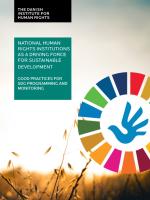
National human rights institutions as a driving force for sustainable development
The 2030 Agenda for Sustainable Development has among its objectives to end poverty, reduce inequalities, provide for good health and quality education, promote action to combat climate change and achieve peace, justice and strong institutions. Moreover, it explicitly states that the Sustainable Development Goals (SDGs), seek to realize the human rights of all. The Agenda is also based on the principles of participation, inclusion, transparency and accountability, which are basic human rights principles.
Given the intertwined and mutually-reinforcing nature of the SDGs and human rights standards, National Human Rights Institutions (NHRIs) are crucial elements of the institutional architecture necessary for the realisation of the 2030 Agenda and can play a key role in the realisation of the SDGs. In addition to being an indicator for strong institutions under SDG 16.a.1, NHRIs´ mandate to monitor and advise states on human rights compliance provides direct contribution to the SDGs. Their role as data generator and as convening partner for stakeholders also offers crucial experience to the 2030 Agenda pledge to ´leave no one behind´.
As showcased in this compilation of good practices, NHRIs add tremendous value to joined-up SDGs and human rights programming and monitoring, contribute to dialogue between state and civil society, and offer critical resources to increase efficiency and coherence.
We strive to make the pdf versions of our publications etc. accessible for screen readers. If you experience any problems, please contact Digital Editor Stine Juhl Nielsen on stni@humanrights.dk
